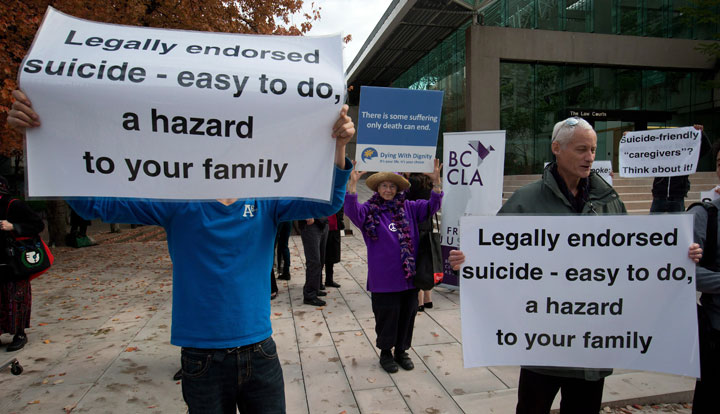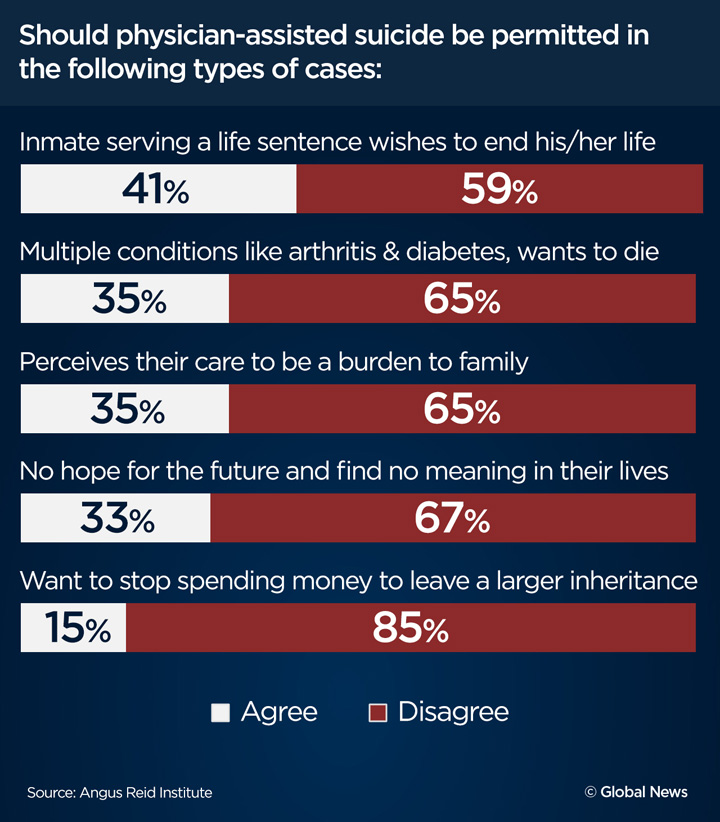TORONTO – Does suffering from a terminal disease impact how you feel about physician-assisted suicide? What if a loved one thought their health care was a burden to their family? These are some of the factors that impact public opinion when it comes to support for doctor-assisted suicide, according to a new poll.

The Angus Reid Institute’s online survey suggests the majority of Canadian adults sampled show moderate to strong support for changes in the country’s laws that would allow doctors to help patients who want to end their lives. But, there are deep divisions in public opinion when it comes to the specific circumstances that would earn their support.
READ MORE: The debate over physician-assisted suicide
When asked about approval for changing the Criminal Code to allow doctors to prescribe lethal drugs to patients who want to die, survey respondents answered as follows:
- Halifax Walmart death: Store will not reopen for ‘weeks’ as remodelling continues
- Will Canada’s tax ‘holiday’ create a ‘mess’ for businesses? Some say yes
- Can you tell fake alcohol from real? Why methanol is so hard to detect
- Alberta seeks to ‘de-risk’ oil, gas pipeline investments in wake of Trump victory
While Angus Reid Institute senior vice president Shachi Kurl calls the debate in Canada “high level” and pointing towards high support for physician-assisted suicide, she says the survey shows the real decision points are actually in the details.
“There are scenarios under which the vast majority of Canadians – those 42 per cent who say they moderately support physician-assisted suicide– are actually drawing a line and saying, ‘Under certain circumstances, we don’t support it.'”
Kurl highlighted Canada’s “aging population” of people who will be having more discussions on end-of-life and palliative care in the years to come. Her data suggests one in three Canadians have already had exposure to palliative care through a loved one.

Get weekly health news
“What we find is that if a loved one had a good experience with palliative care, and felt comfort and dignity in their dying days, then people are far less likely to be supportive of physician-assisted suicide than those for whose loved ones it was a negative experience,” said Kurl. “If that experience went badly, people are far more likely to say, ‘I do support physician-assisted suicide.'”
Respondents who were atheists were also more likely to support the right to die across a range of scenarios.
“Contrary to conventional wisdom, the results point to no important differences by relative affluence or formal educational attainment. Those with better education or more money are neither more nor less likely to support this proposed legislative change,” said the release from Angus Reid.
The case of 29-year-old Brittany Maynard renewed debate in North America. She moved to Oregon after a terminal brain cancer diagnosis to access the Death with Dignity Act. Public Health Officer and State Epidemiologist Dr. Katrina Hedberg said those who access the Act in her state are also typically well-educated.
“The vast majority of these are people who are educated, white, and have cancer; and are also being treated in hospice, so they do have good access to pain control,” she told Global News in a past interview. She said over the past 16 years since the Act was passed in Oregon, there have been over 1,170 prescriptions written–but just over 800 people who ended up using the lethal medication to die.
READ MORE: Woman’s death rekindles arguments surrounding doctor-assisted dying
The Canadian Medical Association backed down from its long-standing opposition to physician-assisted death in August, when it changed its official policy to say it supports the idea of doctors – within the bounds of existing laws – following their conscience when asked to provide aid in dying.
The poll suggested support was somewhat stronger in British Columbia and Quebec–where Bill 52 was passed in June–which allows for and outlines conditions under which terminally ill Quebecers can ask for medical aid in dying.
READ MORE: How doctor-assisted dying works in Oregon









Comments